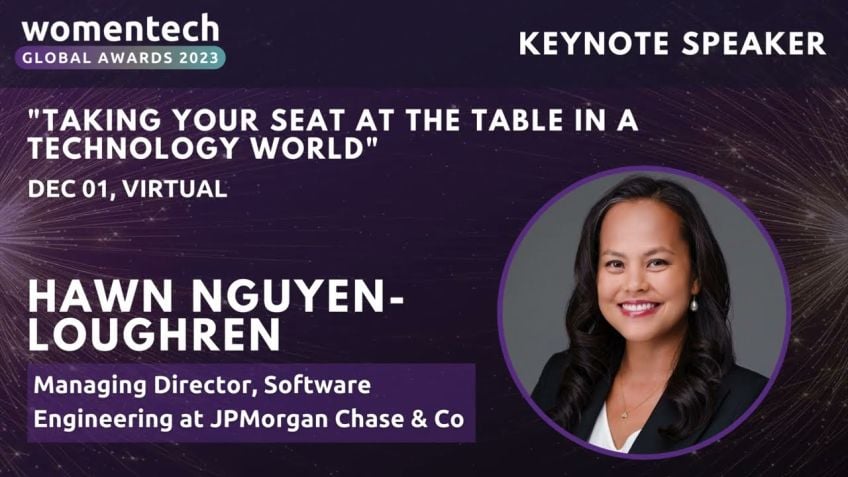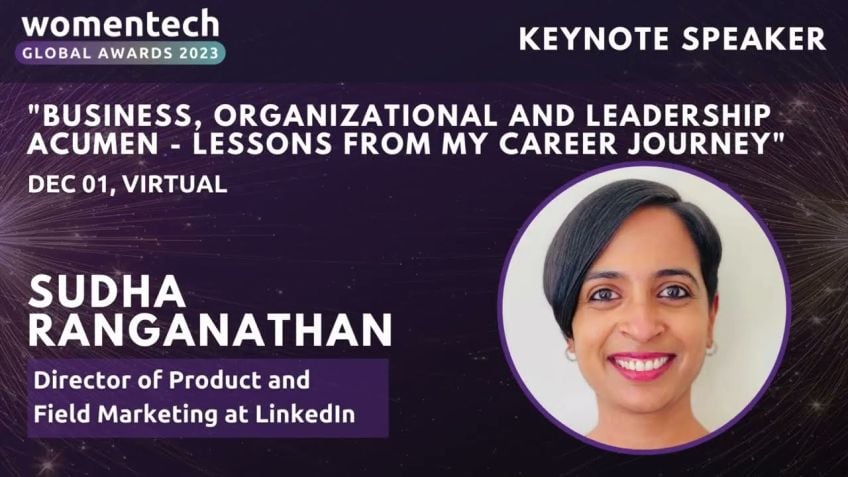Yesterday, Today & Tomorrow ……the journey continues by Asha Keddy
Pioneering Perspectives from Asha Keddy, Corporate Vice President at Intel
Aasha Keddy: The Woman Behind the Position
As the corporate vice president and GM at Intel, Asha Keddy wears many titles, but none define who she is. With her 25 years of experience, she is a patent-holding engineer, a technology futurist, and an impactful force contributing to Intel's multi-trillion dollar 5G market opportunities.
Her journey, filled with lessons she wished she'd learned sooner, epitomizes the power of youth, experience, and the transformative impact of embracing risk. Today, she imparts her wisdom, reflecting on her career, her setbacks, and the lessons she has learned.
Early Lessons from a Technology Futurist
Asha began her journey by reflecting on her schooling days, which evidently, she did not savor. Persistent crying episodes, flunking in first grade, and multiple moments of feeling left out marked her early years. However, these experiences that initially seemed riddled with failure later turned into stepping stones that shaped her journey into becoming a progressively influential technologist.
"I wanted to look at this from as a journey and as a continuum."
Finding Her Voice on the Global Stage
Maintaining a discrete disposition as an introvert didn't stop her from leading crucial discussions on public platforms. As Asha began sharing her insights on wireless technology, the stage transformed into a space, enabling her to amplify her voice and mission.
Adapting to high-profile environments such as the Senate and being part of international events underlined the fact that there was still significant work to be done to promote gender equality in the tech sector.
Asha's Mantra for Success
- Taking Risks: Equating risks with opportunities for growth, she urged the audience to be comfortable with the uncomfortable.
- Being Tenacious: Drawing inspiration from animals, kids, and older people, she emphasized that persistence pays dividends in achieving goals.
- Lifting Others: One of the keys to succeeding, according to Asha, is uplifting others. By lifting others, we not only create more opportunities but also pave the way for a more inclusive environment.
Journeying Forward: Tips From A Tech Industry Veteran
She remembered a time early in her career where she made critical mistakes as a manager. After admitting her errors and receiving sobering feedback from her colleagues, she made a commitment to continuous growth and change.
"Making the same mistakes again and again is just a waste of everyone's time."
Asha also suggested that professionals follow the financial side of things, stating the importance of understanding business decision making, gross margins, company financials, and shareholder value, even if they're focused on technology.
Conclusion
Asha's path is one of embracing risk, inspiring others, and learning from mistakes. She encourages everyone to be authentic and responsible in their roles, admit their failures, and strive to be better each day. Her journey serves as a blueprint for all who aspire to make their mark in the technology industry, reminding us to be grateful and generous as we move forward.
At the end of her enlightening talk, Asha took questions from the audience, and though her time was short, her overarching wisdom left a lasting impact, concluding that being uncomfortable is an ongoing, never-ending journey that catalyzes personal growth.
Video Transcription
Is the corporate vice president and GM at Intel. She has 25 years of experience in the industry as a patent holding engineer and a technology futurist building enterprise systems and defining policies that can transform uh the both working and living environments.So MS Kennedy continues to serve as a pivotal force at Intel in the creation of multi trillion dollar five G market opportunities. And today she, hello, ASHA, she's gonna be right away talking to us about yesterday today and tomorrow the journey continues, that's the name of her talk.
She's gonna help us see and kind of reflect on her journey thus far and really help us to help to communicate the lessons that she wished she had known earlier. And this is always a fun question. Er What, what did we wish? What could we tell ourselves if we went back in time? So we'd love to give you the stage and have you jump right. And
thank you Margaret. And it was so good listening to Mary, I think I'd start off with telling my younger self, don't worry so much. But before I continue, I'll see if I can actually get the slides to work and if not, we'll just have fun. So thank you everyone for being here and I hope uh we can um have some fun and then if you can see my stuff in presentation mode, um Essentially what I wanna say is as I prepared for this talk, I wanted to look at yesterday because we are here because of the past and while we give us the present without tomorrow, there is no hope so.
I wanted to look at this from as a journey and as a continuum with that said, one of my favorite favorite, favorite movies is Madame Curie, the 1944 version, not the more recent version. And as I watch it again and again, it is so gripping to me because it talks about what can be achieved once we have a sense of mission and a sense of purpose. And so that's one of the reasons why I take a lot of time personally to look at the woman who came before us and what they did and how they looked at the world. And this is something that I encourage all of you to do because for the most part, these women, whether it's Mary Curie, Mary Jackson, Rosalind Franklin, Ada Lovelace Hetty or Grace Hopper did it with a lot of Grace pun intended and a lot of generosity and a lot of commitment.
They were very, very driven, but we are here today with women's tech network because there's still a lot more work to be done. And in this, what I wanted to do is talk a little bit about myself and my journey in the hopes that you don't make some of the same mistakes. I do. Maybe you make new mistakes, but also don't make the same mistakes again. And more importantly, I want to help bring out the greatness in you because you're all here to contribute. So who am I at the very core of it professionally? I have these titles of like corporate vice president at Intel and a Wireless Standard expert or ac ti a board member or a public board member. But none of that really defines who I am. They just define what I do at a given point in time. Who I am is defined as a journey of the influences and how and what you bring to the table. And I think if I had to summarize my career and my life in one sentence, it would be proceed with passion for what you care about and embrace the risk just because I say to you embrace the risks. Doesn't mean it's easy or it was easy for me.
It just means it goes with the territory of what you, when you really, really care about something. I think our earliest experiences shape you shape us. And in my case, I uh was in Bombay India, in that rural India and in the US and these photos are a Malan of things. And one thing I really hated was school. I really, really, really hated school. And when I was, when my head was shaved, I hated it even more because everybody made fun of me. And so as I think about it, I, my mom used to always say I cried, I flunked first grade and then I got a double promotion. So the point I'm saying is sometimes the way we get educated, it takes a while. I was in the US Columbus, Ohio and their learning was a lot of fun. And that style because I had, I could draw, I could paint and do all these things. And my point in this is sometimes it's ok to fail at things. And you know, if you just look at me, I basically have gotten everything from being an overachiever to getting zero out of 10 in language just because it was a mixed bag. And I liked one thing and I didn't like another. And as I continued my journey, one of the things that really helped me find my voice was being on stage more and more. I was being asked to go and explain things and represent things.
I'm an introvert, but being on stage forced me to actually do these things because I wasn't really talking about myself. I still am shy to do that. But I was talking about a purpose and a mission and the wireless energies the wireless technology that I think is so fundamental. I mean, we're all here because we have Wi Fi or other things and that's why we are enjoying this event. So that helped me be on stage and it also just helped me define myself. I started wearing a lot more red, not always, but I do it when I'm with a lot of men to stand out are pink. And so we all start figuring out what it is, that is our style to do it. And some of the ones that I did that were more high profile were at the Senate and that really helped me blossom because it forces you to be uncomfortable. And when you're uncomfortable, you grow, you barely ever grow. When you're comfortable, you always grow when you're uncomfortable. But when you start looking at things internationally, like the picture in the, the first picture in the middle and all of it, you can see that uh when I, you know that different countries have different representations, but internationally and this is an international event, we still have a long way to go.
And so I continued to do some of the same things. Embrace pink, embrace um red, embrace uh uh colors and continue, continue, continue and to lift others as we can. So this is basically what I'm saying is the journey continues. But as you can see, um we have a long way to go and we should do that with smiling and with grace and with energy. I want to pivot to some of the things I wish I knew and I'm gonna use my dog Hannah to help me through this just because, you know, dogs are cute and they're actually just more interesting to look at. But before I do that, I'll take a little bit of detour, take risks. This is the single most important thing I could say, be uncomfortable early, early in my career when we worked on Wi Fi and there was not a way to test it because everything was wired. I basically didn't like the way we were testing it because it was very repetitious. This was like 20 plus years ago and more of my foundational patterns. But when I brought it up, the project leader at that time said, no, we don't have time to experiment, go do what you do and this is the way it will be done.
I was not happy and I was with three other people and we basically said, there's gotta be a better way. So I said, OK, we'll give the project lead what he wants in the morning, like 8 to 12. But it's so simple and it's so basic, we can get it done and we use the afternoons to innovate and that became a foundation of how things actually got tested. So I think without taking risks and challenging the status quo, it's very, very difficult to make progress actually, when we look at the macroeconomics, now we are in an inflection point. And now with all the constraints because we had free money before a lot of companies were growing.
But now with the constraints, we're gonna see the next cycle of evolution. And this is the time to actually just look at constrained innovation be tenacious. I like taking inspiration from everything around me, especially animals, kids, older people and all oo seven or Oregon seven or hash seven is one of the symbols. If you Google or seven, this wolf not only separated from its back and walked like 1002 100 miles, 15 hour miles a day, but it actually did so many unique things that California even had to change the laws of how it governed wolves because of this one. Sorry. And um uh inspired children's books, a wolf called w and many other things. So that was because this wolf was persistent in its goal. And I think for us to be persistent, we, our mission, we need to be able to wake up and be joyous about it, but also be driven about it because if it's, it's not worth doing if it doesn't matter to us. And now back to Hannah, as I say, these things, sometimes it's better to beg for forgiveness than ask for permission.
Many times we experiment if you keep asking for permission and I'm not saying breaking the law or something, but I'm just saying a little bit more innovation or challenging the status quo. And sometimes you have to say, oops, sorry and beg for forgiveness because that's how innovation happens.
Just and you know what we get based on your track record or based on your intent and all you know, you will learn from it. One of the things that I didn't do enough early on is celebrating the Wince. Here's Hannah after she's had a full need, played with all the toys. She can strewn it around and deciding to take a nap. We all bond. We're social people when we celebrate. And I think I would just emphasize taking celebrations, celebrating with each other, enjoying what we've accomplished.
Whether it be small like exercising or um whether it be big like establishing a standard through which we all connect and take breaks, sharpening the saw and taking breaks are so important. I know this, but to implement it is difficult because I get tricked by guilt. Oh If I take a break and I'm reading a book on an afternoon, then I'm not doing XYZ. But you just like, you know, it's cliche like um uh sharpening the saw, you have to sharpen the saw to be able to cut more trees down, find joy in life. I know I've quoted Maya Angelou here, but look at the face of joy. Finding joy actually means being able to understand, being able to empathize, being able to look at the bigger picture in life and not obsessing. I have to remind myself to find joy in life. And my dog has taught me a lot of how to do it because I'm a fretter. I worry, I'm a half glass fool. I can be pessimistic. So all these things are things that I continuously grow in. It just means, am I great at it? No, but am I better at it today than I was 10 years ago or even yesterday for the most part. Yes. So finding the joy in life means you're a happier person and you bring that tenacity and that energy to others.
And that means that the creativity comes in, the persistence comes in, the social aspects come in and you actually all make others feel like you are part of something that's way bigger than themselves. And one of the best ways to find joy is to forget about yourself. I mean, one of the reasons I like what women's tech network does is they're lifting others, lift others, lift people above you, lift people who are your juniors, lift everybody, they lift you back up. Life is hard. Life is not fair. But when you lift others, you create more opportunities, you rethink the pie and it actually is some of the most satisfying things as we go through our career. I'm at a phase after 28 years where to me, the next phase really becomes about paying it forward and what can I do to help others that is very meaningful to me. And as I wrap up, I wanna say a few things, um I'll just go back to, um I wanna say a few things we all talk about bringing our authentic self to work and that is important. But along with that comes responsibility, the responsibility of how do we contribute, how are we respectful? How do we help others? We also need to admit mistakes. Have I made a lot of mistakes? Too many.
One of my early experience that actually defined me to be a better manager is when I had just gotten promoted to from what we call a first line manager, which is managing people to a second line managing manager, which is managing the managers. And I was not good at it. I was a micromanager. I didn't know how to transition. And the managers, the three of them came to my cube said we need to talk to you and I said, OK, they took me to a room and they said either you change or we quit sobering. They didn't quit for another few. I mean, actually they didn't quit, we just got reorganized few years later and they all grew, but it was very sobering for them to tell me how I needed to change so they could be empowered. And I think that was foundational for me. And my point is when we make mistakes, it's important to admit them reflect on them, apologize for them, but most importantly, learn and change from them because making the same mistakes again and again is just a waste of everybody's time. And so with I said a lot in a lot of things. But I think the other thing I would also say since this is a more technical conference to follow the finance or to follow the money.
If I had to do my career over again, the one thing I would do differently is even though I have been like a technologist and managing technologies, I would go much more and understand the financial aspects even starting out or even in college, I would go understand some of the business decision making growth margin, operating margin, the company financials instead of just the technology.
Because at the end of the day, it's really about how do is revenue created, how do you increase shareholder value and all of it? But most importantly, a foul I would say um begin every day with gratitude and generosity. What has really helped me is my journaling and gratitude practice of three things. I'm grateful for every morning and every night. And all of this is to say, all we can do is try to be better today than we were yesterday and create more hope for tomorrow. I think with that, I'm pretty much done. And if there are any questions or follow on, I uh I can answer them in a minute. Or two or we can continue. So, thank you
again. We have one quick minute. Thank you so much, ASHA. First of all, um very many people in our chat really like resonating with you in a very kind of I think, personal way, like hearing what you're saying as far as these sobering experiences and you know, even I can even relate to feeling like I had to micromanage and you know, be in control of everything.
So thank you for sharing that part of your story with, with our one quick minute here, we do have a question from the audience asking you how long did it take you to embrace being uncomfortable?
I still am. It's a journey, it's a process. So my point is every time when I think I'm better at it, I'm humbled and now as I have 28 years and after the COVID, I'm thinking what next, I'm uncomfortable again. And so my point is it's lifelong.
Mhm. Yep. And I think that, that, that sums it up right there. We're all going to continue to learn today from all the amazing speakers yourself included. Thank you er for being with us and have a great rest of your event today.
Thank you so much and I really, really appreciate the work you do and this network and I'm so happy to be here.
Thank you so much. Thank you.





